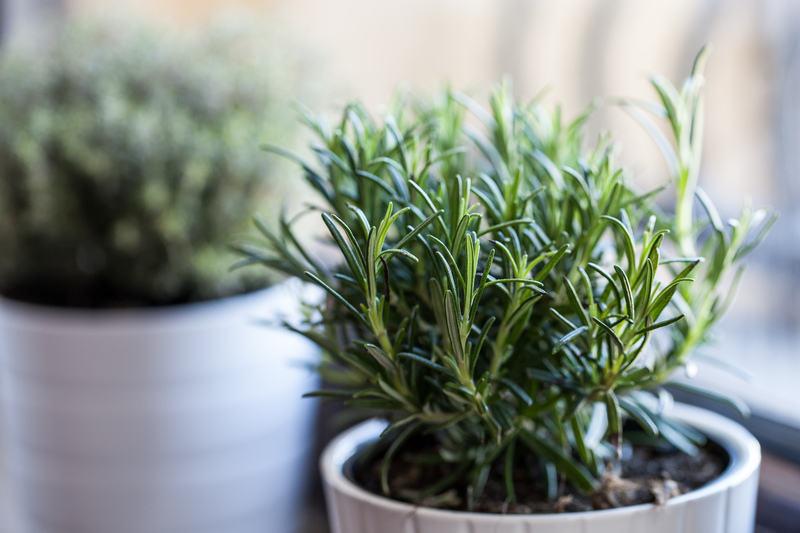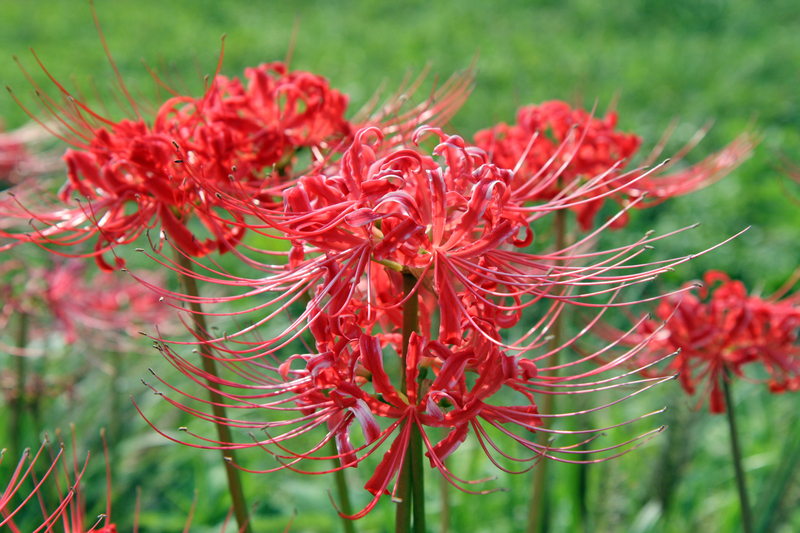Harnessing Organic Waste for Soil Enrichment
Posted on 16/09/2025
Harnessing Organic Waste for Soil Enrichment: A Comprehensive Guide
Soil enrichment holds the key to sustainable agriculture and environmental preservation. By harnessing organic waste, gardeners, farmers, and eco-conscious homeowners alike can transform their soil while reducing landfill waste and combating climate change.
Introduction to Soil Enrichment and Organic Waste
Healthy, fertile soil is the cornerstone of productive agriculture, lush gardens, and robust landscapes. Yet, modern farming practices and urbanization have depleted soil nutrients, resulting in decreasing crop yields and increased dependence on chemical fertilizers.
Harnessing organic waste for soil improvement offers an eco-friendly and cost-effective way to reverse this trend. This technique involves using biodegradable materials and kitchen waste to boost soil fertility, structure, and biodiversity, all while mitigating environmental pollution.

Understanding Organic Waste: What Is It?
Organic waste refers to any waste material that comes from living organisms and is capable of decomposing naturally. This category encompasses a wide variety of sources, including:
- Food scraps (vegetable peels, eggshells, fruit cores)
- Yard clippings (leaves, grass, branches)
- Manure from herbivorous animals
- Paper products (unbleached, unwaxed cardboard, and paper towels)
Harnessing these organic waste resources prevents them from ending up in landfills, where they would contribute to methane emissions.
Why Enrich Soil Using Organic Waste?
There are numerous benefits associated with recycling organic waste for soil enrichment:
- Improved soil structure: Organic matter increases soil's ability to retain water and nutrients, allowing roots to grow more easily.
- Enhanced nutrient profile: Decomposed organic waste supplies essential nutrients such as nitrogen, phosphorus, and potassium in a slow-release manner that plants can absorb over time.
- Increased microbial activity: Enriched soils support beneficial bacteria, fungi, and earthworms that boost soil fertility.
- Reduced waste in landfills: Transforming kitchen and garden waste into soil amendments helps reduce environmental pollution.
- Lower chemical dependency: Supplementing or replacing synthetic fertilizers with organic compost makes gardening more sustainable and cost-effective.
How Does Organic Waste Enhance Soil Quality?
Soil is a vibrant ecosystem of minerals, organic matter, air, water, and living organisms. By recycling organic waste into compost or mulch, you're essentially feeding this ecosystem. Here's how it works:
The Decomposition Process
Organic waste is broken down by microbes, bacteria, and earthworms in a process known as decomposition. As the waste decays, it produces a rich, dark, earthy substance called humus. Humus acts as a reservoir of nutrients and improves soil's texture and water-holding capacity.
Key Improvements in Soil Health
- Improved Aeration: Organic matter loosens compacted soils, creating channels for air and root penetration.
- Moisture Retention: Increased organic content helps soil retain water, reducing irrigation needs.
- Nutrient Cycling: Essential macro- and micro-nutrients are slowly released to plants, reducing the risk of leaching or runoff.
- Increased Biodiversity: Beneficial microbes and earthworms thrive in organically enriched soils, suppressing pathogens and breaking down organic matter further.
Methods of Utilizing Organic Waste for Soil Enrichment
Harnessing kitchen and garden waste to enhance soil can be achieved through a variety of methods. Some of the most effective and widely used techniques are:
1. Composting
Composting is the controlled decomposition of organic materials in the presence of air and moisture to produce nutrient-rich humus. Here's how you can set up your own compost system:
- Select a compost bin or pile in a well-draining, shaded area.
- Add layers of greens and browns: Balance nitrogen-rich "greens" (food scraps, grass clippings) with carbon-rich "browns" (dry leaves, cardboard).
- Maintain moisture and aeration: Keep the pile damp but not waterlogged, and turn it regularly to introduce oxygen and speed up decomposition.
- Wait for maturity: Compost typically takes 2-6 months to mature, depending on temperature, moisture, and the size of materials used.
Your finished compost is dark, crumbly, and earthy smelling--perfect for mixing into flower beds, vegetable gardens, or even topdressing lawns.
2. Vermicomposting
This technique uses composting worms, such as red wigglers, to quickly process organic waste. The worms digest food scraps and produce castings--a potent soil enhancer rich in nutrients and beneficial microbes. Suitable for indoor or outdoor use, vermicomposting is ideal for smaller households and those with limited outdoor space.
3. Mulching
Another excellent way to utilize garden waste is through mulching. Organic mulches made from chipped branches, leaves, straw, or grass clippings can be spread over the soil surface to:
- Reduce weed growth
- Conserve soil moisture
- Protect against erosion
- Slowly release nutrients as they decompose
4. Bokashi Fermentation
Bokashi is an anaerobic fermentation process that allows you to process all types of kitchen waste, including meat and dairy. This system uses a mix of beneficial microbes to ferment organic matter in a sealed container. Bokashi pre-compost can then be buried in soil or added to a compost heap, rapidly enriching the soil with nutrients and microbial life.
The Role of Microorganisms and Soil Biodiversity
One of the most remarkable benefits of using organic waste for soil enrichment lies in the stimulation of soil biodiversity. Microorganisms--such as bacteria, fungi, protozoa, and nematodes--are essential for the decomposition of organic matter. They facilitate nutrient cycling, optimize soil structure, and even help suppress plant diseases.
- Mycorrhizal fungi: These symbiotic organisms extend plant roots' reach, improving nutrient uptake particularly for phosphorus and trace elements.
- Bacteria: Decompose organic material and fix nitrogen, which is crucial for plant growth.
- Earthworms: Consume and fragment organic waste, aerate the soil, and leave behind nutrient-rich castings.
Your commitment to soil enrichment with organic waste is an investment in the life beneath our feet--a thriving underground ecosystem that supports all plant and animal life above ground.
Best Practices for Effective Organic Waste Management
To ensure success when utilizing organic waste for soil enrichment, it's important to follow best practices that maximize benefits while minimizing risks:
- Balance inputs: Too much nitrogen (greens) can cause odors and slow decomposition. Counterbalance with carbon-rich materials (browns).
- Monitor moisture: Aim for dampness similar to a wrung-out sponge to avoid anaerobic conditions that lead to foul smells.
- Chop or shred materials: Smaller particles break down faster, accelerating compost readiness.
- Avoid certain materials: Exclude diseased plants, pet feces, oily foods, or plastics, which can introduce toxins, pathogens, or contaminants.
- Regular turning: Aerate compost or mulch piles frequently to promote even decomposition and prevent compaction.
Safety and Quality Considerations
Properly processed organic waste is typically safe for gardens and food crops. Always ensure that compost reaches recommended temperatures (above 55?C/131?F) to kill weed seeds and harmful pathogens. Finished, mature compost should have a uniform, earthy appearance and scent.
Practical Applications: Where and How to Apply Enriched Soil
Soils enhanced with recycled organic waste have versatile uses in a wide range of settings:
- Vegetable and kitchen gardens: Boosts nutrient availability and crop yields.
- Lawn care: Topdressing with compost reduces patchiness and improves drought tolerance.
- Flower beds: Enhances bloom quality and soil aeration.
- Tree and shrub planting: Supports establishment and strong root systems.
- Potting soil: Blended compost is an excellent base for container plants.
Apply finished compost or worm castings as a mulch, soil amendment, or incorporated directly into planting beds. For best results, repeat applications annually or as needed.
Challenges and Solutions in Harnessing Organic Waste
Despite its many benefits, utilizing organic waste for soil enrichment can present some challenges:
- Odor Issues: Solution: Balance greens and browns, ensure good aeration, and avoid including meat, dairy, or oily foods in compost.
- Pest Attraction: Solution: Keep compost bins covered and avoid adding food scraps known to attract flies or rodents.
- Weed Seeds or Pathogens: Solution: Maintain high composting temperatures and avoid composting invasive species or diseased plants.
- Space Constraints: Solution: Compact composting systems or indoor vermicomposting allow small-scale users to participate.
The Environmental Impact: Beyond the Garden
Recycling organic waste for soil enhancement has far-reaching environmental benefits:
- Reduced greenhouse gas emissions: Organic matter in landfills decomposes anaerobically, producing methane, a potent greenhouse gas. Composting keeps organics out of landfills.
- Decreased chemical pollution: Less reliance on synthetic fertilizers means cleaner waterways and reduced soil acidification.
- Resource conservation: Harnessing organic waste turns garbage into a valuable resource and reduces municipal waste management costs.
- Increased food security: Richer soils mean improved crop yields and resilience against pests, drought, and disease.

Case Examples: Successful Use of Organic Waste for Soil Improvement
Many communities and businesses around the globe are embracing organic waste recycling for soil enhancement:
- Urban community gardens in New York City collect food waste from neighborhood restaurants to produce compost for raised beds.
- Farmers in India and Africa use crop residues and manure to create cost-effective, sustainable fertilizers that reduce dependence on imports.
- Households across Europe are rapidly adopting bokashi and vermicomposting to tackle food waste and enrich urban soils.
These initiatives demonstrate the transformative power of turning local waste streams into fertile ground for food, flowers, and forests.
Conclusion: A Greener, Healthier Future
Harnessing organic waste for soil enrichment is a win-win for your garden, your community, and the planet. As more individuals, families, and businesses adopt these techniques, the cumulative benefits--better soil, less waste, and healthier ecosystems--become magnified.
Get started today by setting up your own compost bin, trying vermicomposting, or supporting local compost collection programs. Your commitment to soil enrichment with nutrient-rich organic waste will help build a greener, more sustainable future for generations to come.
Key Takeaways
- Organic waste is a valuable resource when transformed into compost, mulches, or biofertilizers.
- Soil enrichment using organic waste improves soil health, fertility, and biodiversity naturally.
- Effective management of organic waste not only benefits gardens and farms, but also supports environmental conservation globally.
Harness the potential of organic waste and create fertile, thriving soils--one banana peel, grass clipping, or kitchen scrap at a time.



